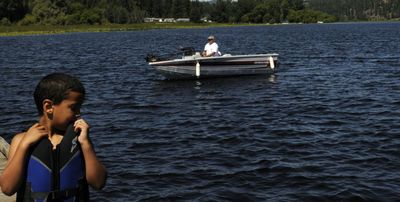Economy’s downturn means great deals on watercraft

A boat may not seem like the most frugal purchase these days. ■ But a large part of the region’s lake culture is made up of middle-class families with relatively modest outfits – a far cry from the Lady Lola, Duane Hagadone’s famous former “superyacht,” or even from some of the high-end boats that will be on display at the Spokane Boat Show, starting Friday at the fairgrounds. Over time, boaters say, owning a boat can pencil out – for both fun and economy – as a long-term source of family recreation.
Right now, potential buyers can benefit from the hard times in the boating industry. “If you have the money and are considering a boat purchase, it’s probably the best time to buy a boat – ever,” said D. Scott Croft, a spokesman for the Boat Owners Association of The U.S. (BoatUS), which represents more than 650,000 boat owners.
Croft argues that boating’s image as a refuge for the rich and famous is undeserved. Three-quarters of all boat-owning families have household incomes below $100,000, he said, and two-thirds of all boats sold are used.
Here are some things to keep in mind if you’re dreaming of sunny days on the lake:
1Do some homework. Decide how you plan to use the boat and how much you can spend, said Harold Petrie, flotilla commander for the Coast Guard Auxiliary in Spokane. He said a lot of boat owners enter a state of “two-foot-itis” – once they get the boat, they decide it’s too big or small. You’ve got a lot of choices, from sailboats to outboards to yachts. And before you go any further, you might consider whether something nonmotorized might be up your alley. Canoes and kayaks can be had for less money and less hassle; of course, you can’t pull a skier behind one, either.
2Shop around. Visit several dealers, or a boat show like the upcoming event at the fairgrounds, to get an idea of the range of prices for new models. Check out resources like BoatUS’s guide to buying a boat at www.boatus.com/guide.
3Consider used. Especially for those who want to spend relatively little on a boat, used may be the way to go. Petrie spent $1,500 for his boat, a 17-foot 1968 craft with a 90-horsepower engine, and the trailer. Because he’s been a lifelong boater, he takes care of maintenance himself. Novices will want to make sure they have a used boat examined by someone who knows what they’re talking about, like a marine surveyor or boat mechanic. Check boat pricing against guidelines like the NADA Marine Appraisal Guide, the Powerboat Guide and Soldboat.com.
4Think about the total price, not the purchase price. You can spend several thousand on a modest used boat or you can spend $100,000 on a luxury cruiser. For most motorboat recreation such as skiing and lake cruising, an average boat would run between $20,000 and $50,000 for a powerboat. But the purchase price is only the beginning. You’ll need to license the boat (which runs around $30, total, in Washington; in Idaho, it’s $20 for boats smaller than 12 feet, and $20 plus $2 per foot for longer ones), and in Washington you’re required to take a boat safety course, which could run you $45 or so. You need a variety of equipment, from life jackets to fire extinguishers to lights for night use.
5And then think about it some more. Where will you put the boat? If you’ve got a place at home, you’ll need a trailer and a vehicle with enough oomph to tow the whole thing to the lake and back. If you want to moor your boat, you can spend hundreds to rent a slip or thousands to buy one. Fuel can be expensive – especially if you use the boat for something like water-skiing. Annual maintenance and repair will cost you something, too, unless you’re handy around a boat – like Petrie. Petrie says he does his own boat maintenance and repair, and estimates he spends $100 or less per year on maintenance. You have to be pretty handy and pretty thrifty to match that, though. For a smaller boat, several hundred dollars a year is more typical; as boats get bigger, so do the maintenance bills.
6Consider insurance. For several hundred dollars a year, you can insure your boat against damage and liability. It’s not a legal requirement, but some marinas may require it.
7A little more about that fuel. Filling up at the marina can run you well above gas station rates – up to a buck a gallon more. However, Petrie says it’s not necessarily true that boats use a lot of fuel. For his purposes – fishing – he says it’s more expensive to drive to a regional lake than to boat there. He says his 24-gallon tank will last him all summer.
On the other hand, if you’re skiing or cruising every weekend, he says, “24 gallons might last you the afternoon.” An article at eboatloan.com says most power boaters use their engines an average of 30 to 40 hours per year; a 17- to 19-foot stern drive boat with 30 hours of engine running time will require about $500 in fuel. That will vary, of course.
8And finally … There’s a lot more to owning a boat than this quick survey can cover. For a comprehensive look at laws and requirements, check out BoatUS’s Web pages for Washington ( www.boatus.org/onlinecourse/statelaws/ Washington.html#Reg) and Idaho ( www.boatus.org/onlinecourse/ statelaws/Idaho.html#Reg).